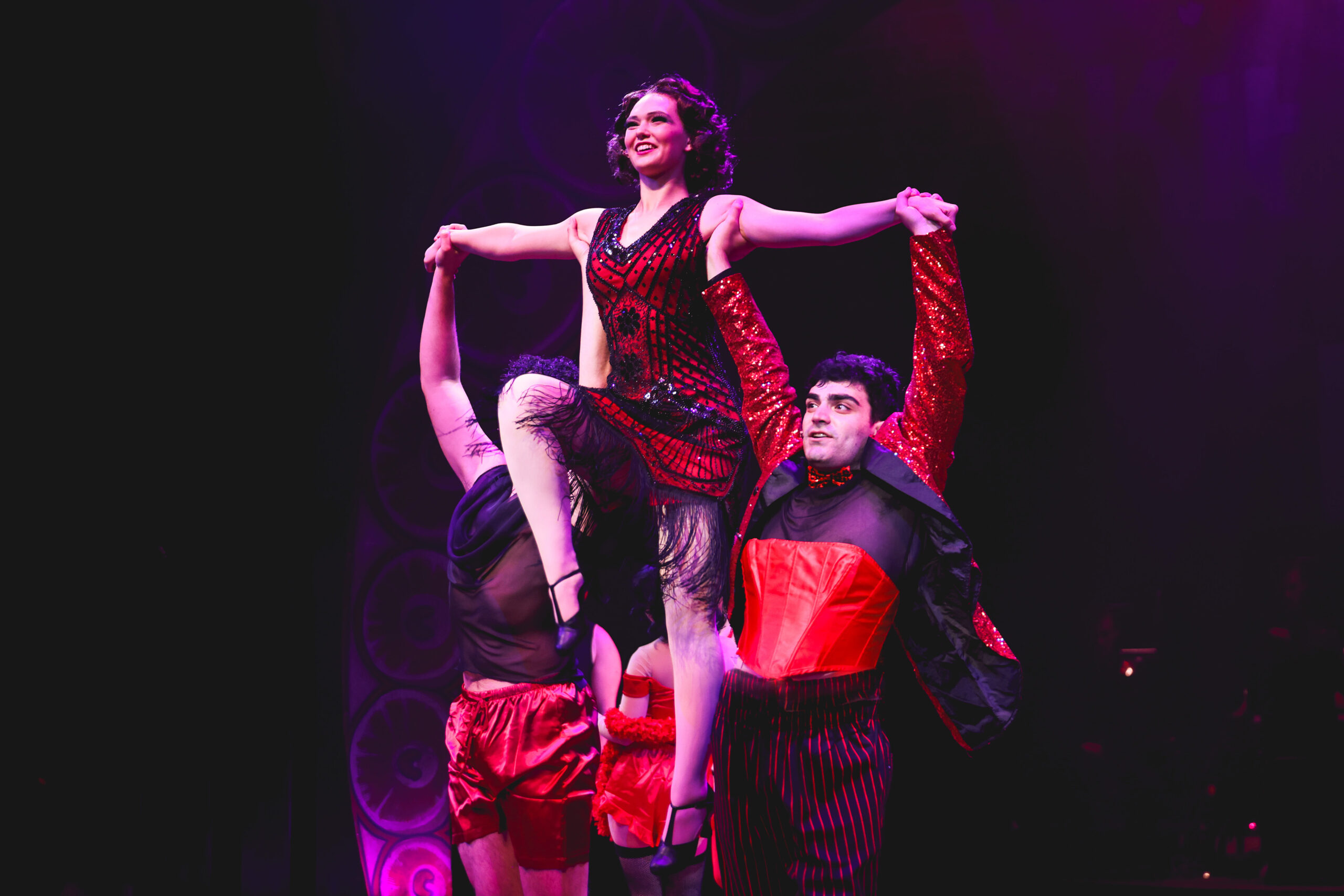
Leave your troubles outside
So life is disappointing? Forget it!
In here life is beautiful
— From ‘Cabaret’
Inflation is high. Democracy is faltering. Political gangs brawl in the street. But inside the raucous Kit Kat Klub, the troubles of Weimar Germany can be left behind.
For a while, at least.
“’Cabaret’ is a phantasmagoria, a surreal vision, of life in Berlin in the late 1920s and early 1930s,” said Jeffery Matthews, a professor of practice in drama in the Performing Arts Department in Arts & Sciences at Washington University in St. Louis.
“It’s the story of Cliff and Sally, and of Fraulein Schneider and Herr Schultz, and how they find one another,” continued Matthews, who will direct the Tony- Drama Desk- and Academy Award-winning show Oct. 27 to Nov. 5 in WashU’s Edison Theatre. “It’s the story of a particular time and a particular place, in all its hedonism and chaos.
“And it’s the story of the environment that enabled Hitler to come to power,” Matthews added. “It’s the story of how their worlds fall apart.”

A time for darkness
“Cabaret” debuted on Broadway in 1966, but in many ways it dates back to 1939, when British writer Christopher Isherwood released “Goodbye to Berlin,” a semi-autobiographical account of expatriate life amidst the rise of national socialism.
British playwright John Van Druten adapted Isherwood’s tales into “I Am a Camera,” which debuted on Broadway in 1951 and as a feature film in 1955. Building on Van Druten, “Cabaret” added music and lyrics by John Kander and Fred Ebb, and additional book by Joe Masteroff. Bob Fosse’s iconic film version premiered in 1972. The musical is regularly revived on Broadway and in London’s West End.
Matthews was particularly inspired by Sam Mendes’ 1993 revival. “That was a very dark, apocalyptic vision, but also the shortest and tightest of them,” he explains. “I wanted to take that version while also honoring the whole life and history of ‘Cabaret.’
“There will be a time for darkness,” Matthews added. “But I couldn’t ask the cast to live there.”

Virtues and vices
“Cabaret” opens with a blast of celebratory transgression. “Outside it is winter,” declares the Kit Kat Klub emcee. “But in here it is so hot!” The plot centers on Cliff, Isherwood’s stand-in, and his relationship with star performer Sally Bowles. But cheerful libertinism soon fades to creeping dread, as Cliff and Sally watch patrons and then old friends join the fascist cause.
“During Weimar, people didn’t think they were going to live very long,” Matthews said. “And they had reason to think that. They’d been deeply traumatized. The sense of nihilism, of hedonism, of just living for today, was very real.
“They were looking for order,” Matthews continued. “’Get the economy on track.’ ‘Get inflation in check.’ ‘Put people to work.’ But with the scapegoating of the Jewish people, all those virtues became horrific vices.”
“In many ways, I think this relates to our current moment,” Matthews added. “’Cabaret’ is a warning about complacency.” And given the rise, in recent years, of antisemitic violence, “that can be very disturbing to think about.
“We don’t want to shy away from what’s tough about this show,” Matthews said. “But in the process, we don’t want to wound our audience. That’s the challenge. It’s a tightrope walk.
“We’re always trying to get ‘Cabaret’ right,” Matthews concluded. “It’s been done and redone, but we keep coming back, we keep working on it, because it’s always so compelling.”

Cast and crew
The cast of 17 is led by Matthew Kalmans as the emcee, Danielle Bryden as Sally and John Speas as Cliff. Heather Anderson is Fraulein Schneider, Cliff and Sally’s landlady. Maxwell Spinner is Herr Schultz, Fraulein Schneider’s Jewish suitor.
Also starring are Tristan Dumas as Ernst, a smuggler who befriends Cliff; and Marielle Hinrichs as Fraulein Kost, a prostitute who lives in Fraulein Schneider’s boarding house. Josie Kopff, Jo Palisoc, Paige Samz, Ella Sherlock, Tina Yu and Anna Zimmerman are the Kit Kat Klub performers: Frenchie, Helga, Texas, Rosie, Lulu and Fritzie. Martin Ibarra, Aaron Kopelnik and Taylor Miller are fellow performers Bobby, Hans and Victor. Rounding out the cast is Cade Edney as club owner Max.
Scenic design is by Robert Mogan, with assistance from Obike Anwisye. Costumes are by Nikki Green, who also served as intimacy coordinator. Musical director is Todd Decker, with assistance from Matthew Sullivan. Vocal coach is Kelly Daniel-Decker. Choreography is by Erin Morris.
Lighting is by Seth Kleinberg with assistance from Nick Cochran and lighting shadow Corin Riahi. Sound is by Beef Gratz. Projection designer is Sean Savoie, with assistance from Zach Cohn. Props are by Emily Frei. Stage manager is John Noonan, with assistance from Juan Cortez. Isabelle Scheibe is stage management supervisor. Jack Rushen is technical director. Catherine Adams is production electrician.

Tickets
Performances of “Cabaret” will take place in WashU’s Edison Theatre beginning at 7:30 p.m. Friday and Saturday, Oct. 27 and 28; and at 2 p.m. Sunday, Oct. 29. Performances will continue the following weekend, at 7:30 p.m. Friday and Saturday, Nov. 3 and 4; and at 2 p.m. Sunday, Nov. 5.
Edison Theatre is located in the Mallinckrodt Student Center, 6465 Forsyth Blvd. Tickets are $20, or $15 for seniors, students and WashU faculty and staff; and free for WashU students. Tickets are available through the Edison Theatre Box Office. For information, call 314-935-6543 or visit pad.wustl.edu.
